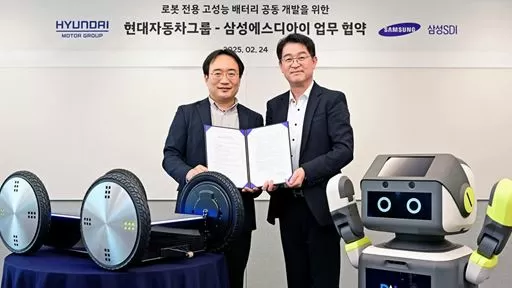Hyundai Motor, Kia and Samsung SDI to Partner on Development of Robot-Specific Batteries
In a move to further advance the field of robotics, three major South Korean companies have joined forces to develop specialized batteries for service robots. Hyundai Motor, Kia and Samsung SDI have announced a partnership that aims to create batteries specifically designed for integration into service robots.
This collaboration is a significant step towards the future of robotics, as it brings together the expertise and resources of three leading companies in their respective fields. Hyundai Motor and Kia are well-known for their innovative and high-quality vehicles, while Samsung SDI is a global leader in battery technology.
The new batteries will be designed to meet the unique needs of service robots, which are becoming increasingly prevalent in various industries such as healthcare, retail, and logistics. These robots require high-performance batteries that can provide long-lasting power and withstand frequent charging cycles.
The partnership between Hyundai Motor, Kia and Samsung SDI will focus on developing batteries that are not only efficient and durable, but also lightweight and compact. This is crucial for service robots, as they need to be able to move around easily and perform their tasks without being weighed down by heavy batteries.
One of the key objectives of this collaboration is to create batteries that can be easily integrated into different types of service robots. This will not only make it easier for manufacturers to incorporate the batteries into their designs, but also allow for more flexibility and customization in the development of service robots.
The three companies are also committed to ensuring that the batteries are environmentally friendly. With the increasing focus on sustainability and reducing carbon footprint, this is a crucial aspect of the project. The batteries will be designed to have a longer lifespan and be easily recyclable, in line with the companies’ commitment to promoting a greener future.
The partnership between Hyundai Motor, Kia and Samsung SDI is a testament to the growing importance of robotics in various industries. As the demand for service robots continues to rise, it is essential to have reliable and efficient batteries that can power these machines. This collaboration will not only benefit the three companies involved, but also contribute to the advancement of the robotics industry as a whole.
The three companies have a strong track record of successful collaborations, and this partnership is expected to yield positive results. By combining their expertise and resources, they aim to develop batteries that will set a new standard for service robots and pave the way for further advancements in the field.
The development of these specialized batteries is also expected to have a positive impact on the economy. With the increasing demand for service robots, there will be a need for more efficient and reliable batteries, which will create new job opportunities and boost the growth of the battery industry.
In addition to the development of batteries, the partnership will also focus on research and development of other technologies related to service robots. This will not only enhance the capabilities of service robots but also contribute to the overall growth and advancement of the robotics industry.
The announcement of this partnership has been met with enthusiasm and excitement from industry experts and stakeholders. It is seen as a significant step towards the future of robotics and a testament to the capabilities of South Korean companies in driving innovation and progress.
In conclusion, the partnership between Hyundai Motor, Kia and Samsung SDI to develop robot-specific batteries is a significant development in the field of robotics. It brings together the expertise and resources of three leading companies to create batteries that will power the next generation of service robots. This collaboration is a testament to the commitment of these companies to drive innovation and contribute to the growth of the robotics industry. With this partnership, the future of service robots looks brighter than ever before.

